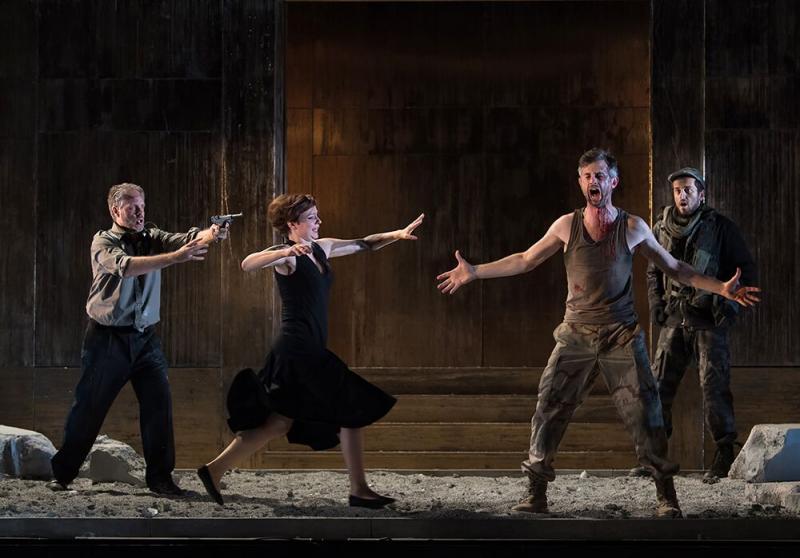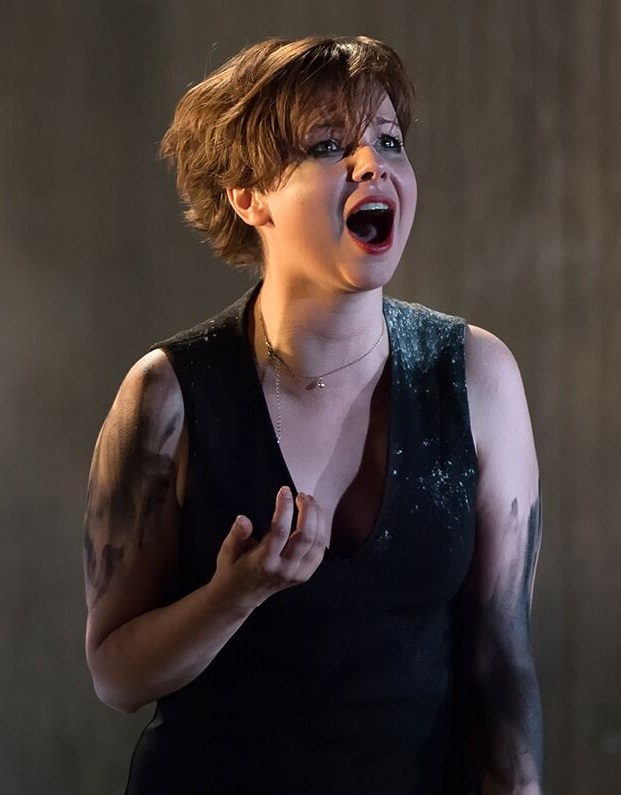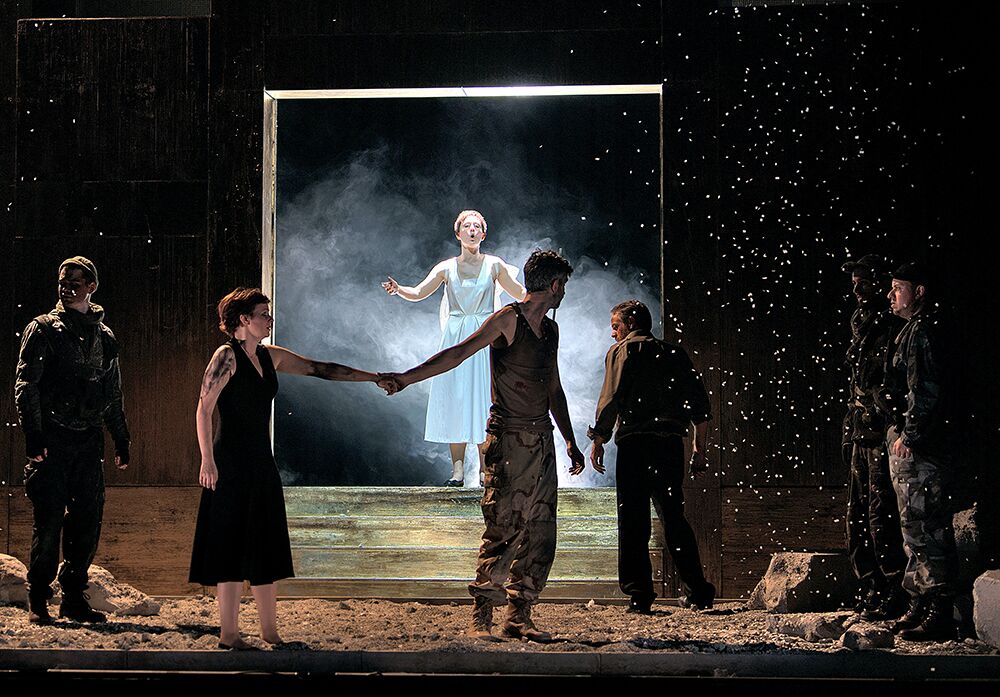Dardanus, English Touring Opera review - mixed fortunes for warzone updating | reviews, news & interviews
Dardanus, English Touring Opera review - mixed fortunes for warzone updating
Dardanus, English Touring Opera review - mixed fortunes for warzone updating
Serviceable modern-dress production puts Rameau’s music centre stage

Baroque opera is always a challenge to stage, and Rameau’s Dardanus is no exception. In its original form, the story, of love in times of war, was infused with allegorical characters and mythological scenes. It flopped, and so Rameau and a new librettist thoroughly revised the work to focus more on the human drama.
 The story tells of Iphise (Galina Averina, pictured left), the daughter of Phrygian King Teucer (Grant Doyle) who is betrothed to his retainer Anténor (Timothy Nelson), but in love with her father’s foe, Prince Dardanus (Anthony Gregory). Offstage battles dictate the course of their love, and each has recourse to a soothsayer, Isménor (Frederick Long), before Dardanus ends up imprisoned by Teucer, eventually to be freed by a repentant Anténor and reunited with Iphise. Venus (Eleanor Penfold) makes an appearance at the end to bless the union, a vestige of the more allegory-laden first version of the opera.
The story tells of Iphise (Galina Averina, pictured left), the daughter of Phrygian King Teucer (Grant Doyle) who is betrothed to his retainer Anténor (Timothy Nelson), but in love with her father’s foe, Prince Dardanus (Anthony Gregory). Offstage battles dictate the course of their love, and each has recourse to a soothsayer, Isménor (Frederick Long), before Dardanus ends up imprisoned by Teucer, eventually to be freed by a repentant Anténor and reunited with Iphise. Venus (Eleanor Penfold) makes an appearance at the end to bless the union, a vestige of the more allegory-laden first version of the opera.
Venus and the soothsayer notwithstanding, the libretto fits well into the modern-day setting of Douglas Rintoul’s production. The single set (designer Cordelia Chisholm) is a concrete bunker in an unnamed warzone: the desert fatigues and copious sand suggest the Middle East, but we’re not told. The various settings are distinguished with modest lighting effects (lighting designer Mark Howland), and offstage gun battles are similarly evoked through flashing lights across the back of the set.
The cast is led from the top by the leading couple, Galina Averina and Anthony Gregory. Averina has a focused soprano tone, impressive clarity in all registers, and beautifully nimble ornaments, although her vibrato might irk Rameau purists. They are unlikely to complain, though, about Gregory, who has a light, conversational delivery, intimate but suitably dramatic. The title role is the most dramatically varied of the opera, and Gregory gives a convincing and emotionally sophisticated portrayal. The supporting roles are less secure. Timothy Nelson, as Anténor, struggles with the upper register, where he has recurring tuning problems. Grant Doyle looks the part of the overbearing king, but much of the music lies too low for his voice. Stronger support, though from Alessandro Fisher in the small role of Arcas (and no-doubt secure too as understudy to Gregory) and Eleanor Penfold as Venus (pictured below), she and the supporting cast making a convincing case for the modest stagecraft during the instrumental chaconne that ends the opera. Conductor Jonathan Williams leads a lively and lucid account of Rameau’s diverse score. His tempos are never rushed, but the rhythmic intensity, especially in the many dance numbers, propels the music. He also brings impressive coherence to each of the acts by deftly weaving together the often contrasting successive numbers. Period-instrument accompaniment is provided by The Old Street Band. Their tone is bold and forthright, painting Ramaeu’s textures in clean primary colours. The orchestral balance is string-heavy, but with the woodwinds occasionally coming to the fore, the oboes energising the dances, and the flutes and bassoons giving a ghostly resonance to the mournful arias of the prison act. This is a serviceable production, and a welcome introduction to the UK stage for the revised version of Rameau’s opera, but the music is definitely the main draw here.
Conductor Jonathan Williams leads a lively and lucid account of Rameau’s diverse score. His tempos are never rushed, but the rhythmic intensity, especially in the many dance numbers, propels the music. He also brings impressive coherence to each of the acts by deftly weaving together the often contrasting successive numbers. Period-instrument accompaniment is provided by The Old Street Band. Their tone is bold and forthright, painting Ramaeu’s textures in clean primary colours. The orchestral balance is string-heavy, but with the woodwinds occasionally coming to the fore, the oboes energising the dances, and the flutes and bassoons giving a ghostly resonance to the mournful arias of the prison act. This is a serviceable production, and a welcome introduction to the UK stage for the revised version of Rameau’s opera, but the music is definitely the main draw here.
rating
Explore topics
Share this article
The future of Arts Journalism
You can stop theartsdesk.com closing!
We urgently need financing to survive. Our fundraising drive has thus far raised £49,000 but we need to reach £100,000 or we will be forced to close. Please contribute here: https://gofund.me/c3f6033d
And if you can forward this information to anyone who might assist, we’d be grateful.

Subscribe to theartsdesk.com
Thank you for continuing to read our work on theartsdesk.com. For unlimited access to every article in its entirety, including our archive of more than 15,000 pieces, we're asking for £5 per month or £40 per year. We feel it's a very good deal, and hope you do too.
To take a subscription now simply click here.
And if you're looking for that extra gift for a friend or family member, why not treat them to a theartsdesk.com gift subscription?
more Opera
 Tosca, Royal Opera review - Ailyn Pérez steps in as the most vivid of divas
Jakub Hrůša’s multicoloured Puccini last night found a soprano to match
Tosca, Royal Opera review - Ailyn Pérez steps in as the most vivid of divas
Jakub Hrůša’s multicoloured Puccini last night found a soprano to match
 Tosca, Welsh National Opera review - a great company reduced to brilliance
The old warhorse made special by the basics
Tosca, Welsh National Opera review - a great company reduced to brilliance
The old warhorse made special by the basics
 BBC Proms: The Marriage of Figaro, Glyndebourne Festival review - merriment and menace
Strong Proms transfer for a robust and affecting show
BBC Proms: The Marriage of Figaro, Glyndebourne Festival review - merriment and menace
Strong Proms transfer for a robust and affecting show
 BBC Proms: Suor Angelica, LSO, Pappano review - earthly passion, heavenly grief
A Sister to remember blesses Puccini's convent tragedy
BBC Proms: Suor Angelica, LSO, Pappano review - earthly passion, heavenly grief
A Sister to remember blesses Puccini's convent tragedy
 Orpheus and Eurydice, Opera Queensland/SCO, Edinburgh International Festival 2025 review - dazzling, but distracting
Eye-popping acrobatics don’t always assist in Gluck’s quest for operatic truth
Orpheus and Eurydice, Opera Queensland/SCO, Edinburgh International Festival 2025 review - dazzling, but distracting
Eye-popping acrobatics don’t always assist in Gluck’s quest for operatic truth
 MARS, Irish National Opera review - silly space oddity with fun stretches
Cast, orchestra and production give Jennifer Walshe’s bold collage their all
MARS, Irish National Opera review - silly space oddity with fun stretches
Cast, orchestra and production give Jennifer Walshe’s bold collage their all
 Káťa Kabanová, Glyndebourne review - emotional concentration in a salle modulable
Janáček superbly done through or in spite of the symbolism
Káťa Kabanová, Glyndebourne review - emotional concentration in a salle modulable
Janáček superbly done through or in spite of the symbolism
 Buxton International Festival 2025 review - a lavish offering of smaller-scale work
Allison Cook stands out in a fascinating integrated double bill of Bernstein and Poulenc
Buxton International Festival 2025 review - a lavish offering of smaller-scale work
Allison Cook stands out in a fascinating integrated double bill of Bernstein and Poulenc
 Tosca, Clonter Opera review - beauty and integrity in miniature
Happy surprises and a convincing interpretation of Puccini for today
Tosca, Clonter Opera review - beauty and integrity in miniature
Happy surprises and a convincing interpretation of Puccini for today
 Hamlet, Buxton International Festival review - how to re-imagine re-imagined Shakespeare
Music comes first in very 19th century, very Romantic, very French operatic creation
Hamlet, Buxton International Festival review - how to re-imagine re-imagined Shakespeare
Music comes first in very 19th century, very Romantic, very French operatic creation
 Falstaff, Glyndebourne review - knockabout and nostalgia in postwar Windsor
A fat knight to remember, and snappy stagecraft, overcome some tedious waits
Falstaff, Glyndebourne review - knockabout and nostalgia in postwar Windsor
A fat knight to remember, and snappy stagecraft, overcome some tedious waits
 Salome, LSO, Pappano, Barbican review - a partnership in a million
Asmik Grigorian is vocal perfection in league with a great conductor and orchestra
Salome, LSO, Pappano, Barbican review - a partnership in a million
Asmik Grigorian is vocal perfection in league with a great conductor and orchestra

Add comment